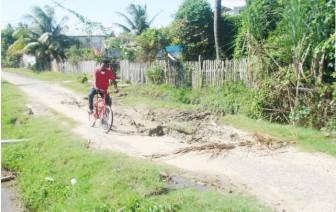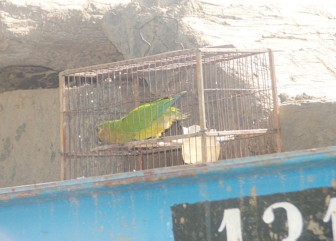Photos by Marcelle Thomas and Shabna Ullah
Long before you reach Woodley Park you catch the aroma of the village. As you get closer the scent becomes stronger: eschallot and thyme.
Cooks can feel at home in Woodley Park. The West Bank Berbice community, also known as No 11 Village is recognosed for the varied seasonings it produces. Thyme, eschallot, celery and other herbs grow in abundance in this seaside village, and the scent is carried far and wide on the wind. In every yard, cash crop farmers or not, you would find seasoning beds.
Home to not more than 400 persons, residents boast that the village is a tightly-knit Indian community where “everybody knows everybody or everybody related to everybody”; and if not related through lineage, villagers are connected through marriage.
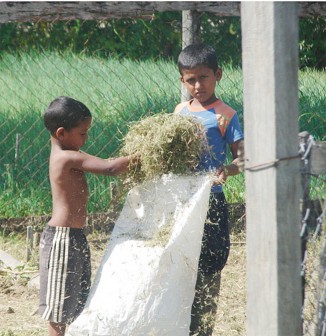
cleaning their backyard.
Most persons in the community are cane-cutters or work in the private rice fields in the southern backlands of Woodley Park. “There is not much work here; you either cut cane for Blairmont Estate, farm or work somebody rice field,” said Rampersaud, a village elder. Other villagers echoed the village elder’s point, some calling if not for the development of the community for that of the larger towns so that people have options.
Naitram Rabindranaugth was very upset when Stabroek News approached him. He was on his way to fish in the village canal. Treading the sun-scorched road barefoot as he hummed a song and held out his fish net, he said: “Ya’ll want to write Woodley Park? Write about why I with a diploma in agriculture donkey years now can’t get a wuk, but gat to go catch fish and beg people to buy.” He told the story that he could not get a job in Guyana, so he went to work in Barbados as an under-manager at the Carrington Sugar Estate there.
However his father took ill and he was forced to leave and return home. He said here he sent out stacks of applications but did not get a favourable response from anyone, and so he resorted to an old skill, fishing. He has been doing that for over four years now, but still hopes that one day he will go back to the estates to do what he does best.
However, he feels because of current politics his dream is killed. “To get a job at any of the estates you have to know somebody. I can tell you. This area is a PPP stronghold; if you not PPP then yuh goose cook. I ain’t into politics; I have the qualification, hire me or not… I went to this minister that minister and today I waiting to catch fish…” he said.
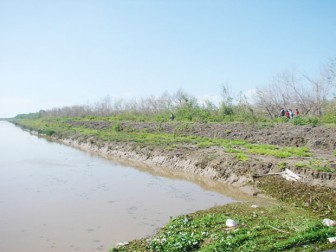
As we were speaking to the villagers they began open up, letting us know that behind the tranquil yet industrious village veil lies a country community being infiltrated by illegal drugs, adding to the already high alcohol use. Many expressed fear and requested anonymity as they informed this newspaper that marijuana and crack cocaine addiction was seeping into the community. “The young people now are being exposed to the drugs from the neighbouring village. Dem have nothing else to do when dem done cut cane by 11’o clock, so they come home and smoke up and drink nuff rum,” said a prominent village member. “When dem finish work on the weekend dem sit and drink rum. Nowhere to go, nothing to do, so rum is yuh comfort,” an elderly mother added.
“The old people die out and the younger generation just don’t give a hang … Here was very peaceful but it change up now. Plenty drugs and so defiling the village man, but you have to be careful how you talk because next day the people sell de drugs know who report,” a middle-aged woman said.
As you explore the village there are not any visible rum shops and one wonders where the “drinkers” go to imbibe. The villagers said it is under bottom houses that the weekend sprees are held. “This person bring a quarter, he bring a large, one a coke and we have
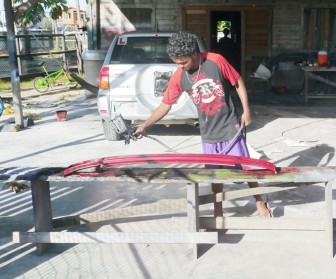
fun,” said a cane-cutter who was with a group drinking. In a joking manner he said he was reluctant to give his name or have his photo taken, because, “If meh wife find out is trouble; a tell she a come fuh check de boys.” As he pleaded to take the group’s photo, they all got up, liquor in hand and quickly dispersed laughing.
Hinduism is the predominant faith of Woodley Parkers, although there are a few Muslims and Christians. However while there is a village Mandir and Mosque on the public road in the village, Christians have to travel to nearby villages to worship as there is no church in their community.
An 11-year-old pointed out the community recreational centre and park, but was quick to explain that it is hardly ever used. Asked what life is like for a child in Woodley Park she responded, “Weekdays go to school, come home and study and sleep. Weekends most children stay indoors and watch TV or go on the computer and internet… I help with chores and water plants but we don’t play in the streets,” she said. Khan said that the children of this generation are not interested in playing outdoors, as with the advent of the television and internet they have become “too house up” and is an indication of the changing nature of the community. “ Children
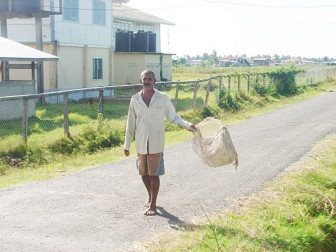
hassar net on his way to fish.
now ain’t time with backdam and running climbing trees like we long ago …they want to stay inside and watch TV, and that is why most a dem fat,” he said.
Little Ervin Bharat begged to differ .He said he enjoyed not only playing outdoors but helping his parents on weekends since he is given his weekly allowance from the eschallot crop he helps to clean and sell. His parents Shalina and Parmanand Bharat beamed as they explained that their son Ervin is their greatest helper. With over 60 lbs of shallot already parcelled for sale Ervin demonstrated the “art in knocking the dirt out of the shallots.” He worked patiently picking, sorting, knocking and washing the seasoning as we watched. He even knew the best planting and reaping schedules. “You get the most money when it’s rainy season because then is when de price deh because it most difficult to grow. When it sunny you would get 60 or 70 lbs per bed, but rain it reduce to half …the price goes from $100 a pound to $300 or $280 wholesale” he said.
A student of the village primary school, Woodley Park Primary, which also has a secondary department, Erwin said that while he loved gardening he did not want to be a farmer, but aspired to be a doctor.
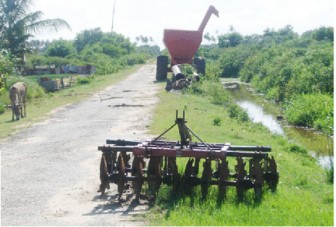
on a Woodley Park road.
Residents were excited that a boy in the village had performed well at the recent Caribbean Secondary Education Certificate examination. His mother, Sonia Seebalack, said he achieved nine distinctions in Science subjects and a grade two in Spanish. Seebalack related that her son had passed to go to the New Amsterdam Multilateral, but was given the option of attending Presidents College, and he took it. She said she almost took him out of PC because he cried for almost the whole of the first year, and that made her cry too. However, now she was glad she had encouraged him to stay and make the most of his opportunity there. Bridgemohan also went to extra lessons when he came home on weekends.
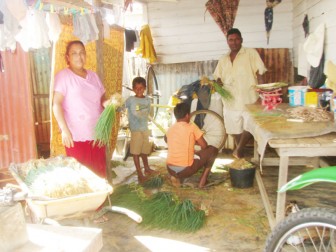
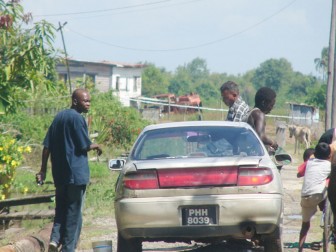
daily business at Woodley Park.

